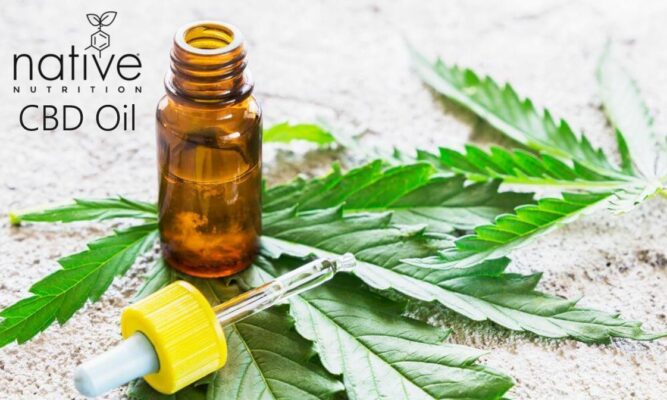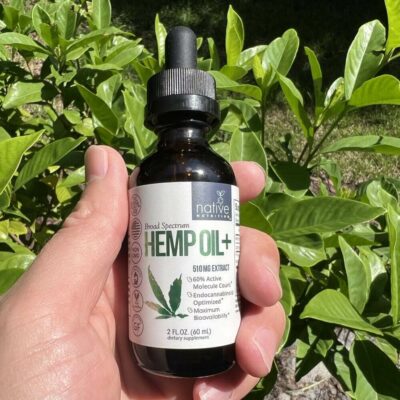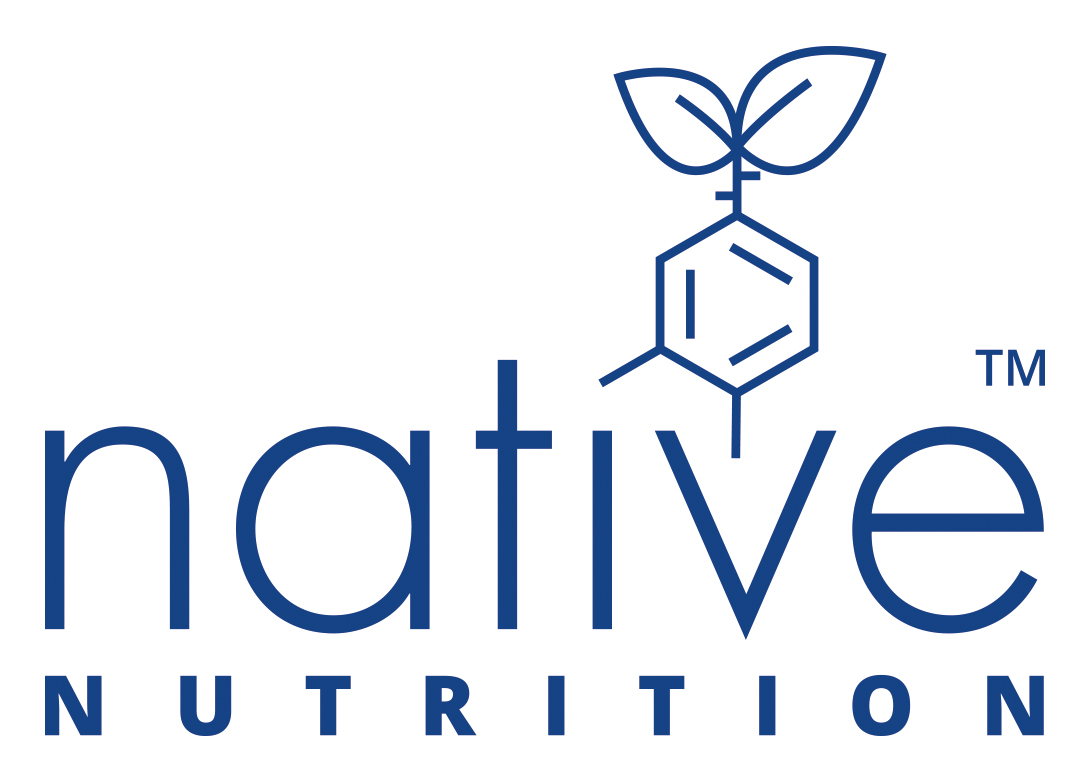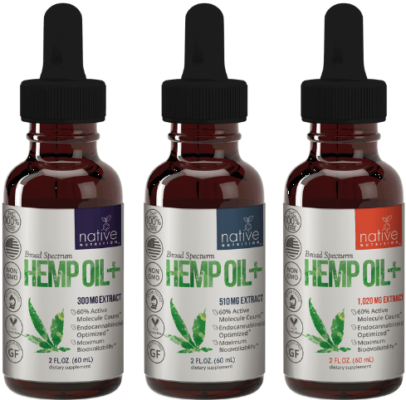What is CBD oil?

CBD is the acronym for cannabidiol. CBD oil is derived from particular chemical compounds that are present in cannabis plants (aka marijuana plants) and hemp plants. These compounds are known as cannibinoids. There are more than 100 known cannibinoids in the cannabis plant.
Two of the most well-known (and most researched) cannibinoids are CBD and THC, or tetrahydrocannabinol. THC is the primary psychoactive compound in marijuana, and it accounts for marijuana’s (in)famous “high”.
Native Nutrition CBD oil, on the other hand, is not psychoactive. That means it does not cause a “high” sensation when consumed. What it does do is influence the body in several potentially beneficial ways.
CBD oil is produced by extracting CBD from a plant and then diluting that extraction with a carrier oil such as coconut oil. Different manufacturers of CBD oils utilize different extraction methods and carrier oils. Products made with CBD oil take a variety of forms and can be found in a range of potencies.
How does CBD Oil work?
Researchers are still working to determine precisely how CBD affects the human body. Medical research Doctor Brent Bauer from the Mayo Clinic mentions what they know so far is that CBD (and all other cannabinoids) influences certain receptors within the body to evoke a range of effects.
Cannabinoids may easily synergize with these receptors because human bodies already produce some cannabinoids on their own as part of the endocannabinoid system, or ECS. This system has two built-in cannabinoid receptors—CB1 receptors and CB2 receptors—that are responsible for receiving and translating signals from different cannibinoids.
CB1 receptors can be found throughout the body, but they’re especially concentrated in the brain, where they play a role in appetite, coordination, emotions, memories, mood, pain, and more. CB2 receptors, meanwhile, are mostly concentrated in the immune system. They play a role in inflammation and pain.
While more studies are needed in this area, researchers believe that CBD might stimulate the body to use more of its own cannabinoids, thus influencing the cannabinoid receptors.
CBD is becoming increasingly popular as a natural treatment option for a variety of mental and physical ailments. In particular, CBD has been shown to:
- Alleviate pain. Research suggests CBD can help relieve pain for two primary reasons: It influences the brain’s neurotransmitters in ways that may minimize perceived pain, and it has anti-inflammatory effects. Together, these factors help explain why CBD has been shown to help reduce chronic pain, including pain brought on by rheumatoid arthritis and multiple sclerosis.
- Relieve anxiety and depression. Studies have found that CBD may be helpful in alleviating social anxiety, post-traumatic stress disorder (PTSD),depression, obsessive compulsive disorder, and generalized anxiety. This is largely thanks to CBD’s interaction with the neurotransmitter serotonin, which plays a big role in mood and social behavior.
- Assist in the management of other mental health issues. Though more research is needed, some studies have suggested that CBD might have antipsychotic effects that could be useful in the treatment of mental health conditions such as schizophrenia. Additionally, there’s some evidence that CBD might assist in substance abuse treatment and recovery.
- Improve skin health. Thanks in large part to its anti-inflammatory qualities, CBD oil may assist in the treatment of acne. It’s also been shown to reduce the production of sebum, an oily substance that is naturally produced by our skin and can contribute to acne when it’s produced in excess.
- Boost cognitive health. There’s some evidence that CBD may have “neuroprotective” effects, which is a fancy way of saying it may keep the brain healthy. This helps explain why research suggests CBD may be useful in the management of neurological conditions such as Parkinson’s disease, Alzheimer’s disease, multiple sclerosis, and epilepsy. One review also suggested CBD may help protect the hippocampus (a brain region responsible for learning and memory, among other important functions) when a person is stressed.
- Improve sleep. Several studies have suggested that CBD may assist in the treatment of insomnia. This is most likely thanks to its antianxiety and stress-relieving effects.
- Bolster heart health. Recent studies have found that CBD might help protect heart health in several ways, from lowering blood pressure to reducing inflammation and cell death (which is linked to heart disease).
- Ease cancer treatment side effects. Evidence suggests CBD may help ease cancer symptoms, most notably pain brought on by cancer. It may also help relieve some of the side effects of cancer treatment, by, for example, limiting nausea and vomiting brought on by chemotherapy. Limited research has even suggested that CBD might have antitumor effects.
- Prevent diabetes. A growing (albeit still small and often on mice) body of research suggests CBD might help prevent Type 1 Diabetes. That’s because it may reduce inflammation in the pancreas, which is associated with diabetes.
What does CBD, Hemp Oil feel like?
As noted above, CBD does not have psychoactive properties, which means it does not produce a “high.” In fact, it doesn’t produce much sensation at all. Rather, it’s more likely to relieve unwanted sensations.
For example, CBD is likely to relieve nausea, pain, anxiety, depression, insomnia, and so on. In their absence, people may feel enhanced physical comfort, greater relaxation or calm, improved mood, better sleep, and so on.
All that being said, it’s important to note that everyone experiences CBD’s effects a little differently. For example, CBD may take effect more or less quickly or stay in a person’s system for shorter or longer. The feelings produced by using CBD may also vary depending on how CBD is ingested and how much CBD is ingested at a given time.
How to use CBD?

CBD oil is frequently incorporated into a wide number of products and can be used in a variety of ways. To date, here are some of the best ways to take CBD:
Gummies and other edibles
CBD-infused food products and beverages are an extremely effective method for taking CBD, because they involve something that people already do every day: Chewing and swallowing. That’s really all it takes to ingest CBD-infused edibles, which can range from gummy candies to cookies, ice cream, smoothies, or even infused cooking oils. Some people also choose to add a few drops of CBD oil to their water or another beverage.
This method involves a delay between when the CBD is ingested and when its effects start to kick in. Once they do kick in, these effects tend to last longer than the ones experienced via vaping. For this reason, many people with chronic conditions prefer the long-lasting relief offered by ingesting CBD oil.
Gel capsules
Gel capsules function in much the same way as gummies and other edibles, only no food or beverage is required. Instead, you simply swallow the capsule with some water just as you would a non-chewable vitamin.
Many people like using gel capsules because the doses are already pre-measured. As with edibles, gel capsules take some time to kick in, but their effects tend to last longer than other delivery systems.
Vaping
Vaping involves using a vaporizer (which is typically about the size of a pen) to heat up CBD oil and inhale the resulting vapor. This method of taking CBD requires a bit more of a learning curve than consuming CBD in edible form. (Translation: You may cough the first few times you use a vape pen until you figure out how long to drag on it.)
Coughing aside, vaping is one of the quickest ways to feel the effects of CBD oil, because the CBD enters directly into the lungs and then spreads throughout the bloodstream. For this reason, some folks choose vaping to address acute symptoms. While it’s quick to take effect, vaped CBD tends to pass through your system more quickly than it does when consumed as edibles or tinctures.
Tinctures
Sublingual tinctures—that’s a fancy way of referring to CBD products that are meant to be taken under the tongue—are another popular CBD delivery system. Using a tincture involves dropping the recommended serving size of the oil or tincture underneath your tongue, waiting for a minute, and then swallowing.
Not only is this delivery system quite simple, but it also tends to produce effects fairly quickly. Effects tend to kick in within a few minutes and last for a few hours. This is usually how the best CBD Oil is made.
Topicals
People who are in need of localized pain relief and/or skin healing may choose to use topical creams, lotions, and salves. For the most part, these products work externally (meaning they’re less likely to produce mental or full-body effects). They’re primarily designed for relief from neck and back pain, arthritis pain, muscle soreness, skin conditions, and so on.
Bottom line? There are several ways to utilize CBD oil. The best method will vary depending on the condition(s) that a person is hoping to treat, their optimal dose, and how long they want to feel CBD’s effects.
What are the Benefits of CBD Oil?
- Alleviate pain. Research suggests CBD can help relieve pain for two primary reasons: It influences the brain’s neurotransmitters in ways that may minimize perceived pain, and it has anti-inflammatory effects. Together, these factors help explain why CBD has been shown to help reduce chronic pain, including pain brought on by rheumatoid arthritis and multiple sclerosis.
- Relieve anxiety and depression. Studies have found that CBD may be helpful in alleviating social anxiety, post-traumatic stress disorder (PTSD),depression, obsessive compulsive disorder, and generalized anxiety. This is largely thanks to CBD’s interaction with the neurotransmitter serotonin, which plays a big role in mood and social behavior.
- Assist in the management of other mental health issues. Though more research is needed, some studies have suggested that CBD might have antipsychotic effects that could be useful in the treatment of mental health conditions such as schizophrenia. Additionally, there’s some evidence that CBD might assist in substance abuse treatment and recovery.
- Improve skin health. Thanks in large part to its anti-inflammatory qualities, CBD oil may assist in the treatment of acne. It’s also been shown to reduce the production of sebum, an oily substance that is naturally produced by our skin and can contribute to acne when it’s produced in excess.
- Boost cognitive health. There’s some evidence that CBD may have “neuroprotective” effects, which is a fancy way of saying it may keep the brain healthy. This helps explain why research suggests CBD may be useful in the management of neurological conditions such as Parkinson’s disease, Alzheimer’s disease, multiple sclerosis, and epilepsy. One review also suggested CBD may help protect the hippocampus (a brain region responsible for learning and memory, among other important functions) when a person is stressed.
- Improve sleep. Several studies have suggested that CBD may assist in the treatment of insomnia. This is most likely thanks to its antianxiety and stress-relieving effects.
- Bolster heart health. Recent studies have found that CBD might help protect heart health in several ways, from lowering blood pressure to reducing inflammation and cell death (which is linked to heart disease).
- Ease cancer treatment side effects. Evidence suggests CBD may help ease cancer symptoms, most notably pain brought on by cancer. It may also help relieve some of the side effects of cancer treatment, by, for example, limiting nausea and vomiting brought on by chemotherapy. Limited research has even suggested that CBD might have antitumor effects.
- Prevent diabetes. A growing (albeit still small and often on mice) body of research suggests CBD might help prevent Type 1 Diabetes. That’s because it may reduce inflammation in the pancreas, which is associated with diabetes.
Is CBD oil safe?
As noted above, CBD oil is generally considered safe and is unlikely to cause any serious negative side effects. But if you’re interested in giving CBD oil a try, then adhering to a few simple strategies can help ensure your experience is a positive one. In that spirit, keep the following guidelines in mind:
Know that not all products are created equal. Because the CBD market is still relatively new, it’s also still relatively unregulated. This means the quality of products on the market can vary wildly, so it’s important to do your research. Look for CBD products that don’t use potentially harmful fillers or additives and that utilize natural ingredients. You want to be able to identify and trace all of the ingredients on the label. If you’re unsure about a certain product, a call to the company’s customer service team can help you determine whether it seems to be making legitimate claims.
Consult with your doctor. Because CBD may interact with some medications and because it affects everyone a little differently, it’s a good idea to talk to your doctor about your plans to utilize CBD oil—especially if you’re using prescription medications or dealing with any serious medical conditions. While some doctors are more versed in the world of CBD than others, this is a good first step if you’re unsure about how CBD fits into your life. (And your doctor might be able to refer you to a more knowledgeable healthcare provider if the topic isn’t in their wheelhouse.) What’s more, some states require a recommendation from a doctor in order for you to purchase CBD.
Start with a low dose and gradually build up. If you’re new to using CBD, then it’s smart to start out with the smallest dose possible and gradually work your way up from there depending on how your body and mind respond. The right dosage for you is highly specific because it’s affected by a number of factors ranging from the concentration and form of CBD that you’re taking to your weight, the condition you’re treating, and your individual body chemistry. There’s no need to take a “hero’s dose” right out of the gate; instead, be open to experimenting in gradual increments until you’ve found the optimal dose for you.
Experiment with your optimal delivery system. Just as identifying the right CBD oil dosage for you might take some experimentation, you may want to experiment with the CBD oil delivery system that works best. CBD can be found in everything from capsules and under-the-tongue sprays to tinctures, beverages, foods, candies, vape pens, and topical lotions and salves. Each of these modes operates a little differently—for example, vape pens will go to work immediately and wear off sooner, while edibles take a little longer to kick in and last longer—so you’ll want to experiment with the form that best suits your needs.
If you’re pregnant or nursing, you may want to abstain. Even though CBD is considered safe and rarely produces side effects, its possible effects on fetuses or nursing infants are still relatively unexplored. For this reason, it may be wise to abstain from using these products while pregnant or breastfeeding.
Don’t assume CBD oil is a “cure-all”. While the research into positive CBD oil effects is promising, it’s important not to assume that CBD oil is a miracle cure for any and every condition under the sun. That means you shouldn’t go off all your meds or stop seeing your physician just because you’ve had a positive experience with CBD. For the most part, it’s a good idea to view CBD as a complementary supplement or therapy as opposed to a total replacement for conventional medical care.
Is CBD oil legal?
CBD oil is legal in 30 states where medicinal and/or recreational marijuana is legal. FDA recognizes the potential opportunities that cannabis or cannabis-derived compounds. in 2018, the United States FDA approved CBD (Epidiolex) as a therapy for two rare conditions characterized by epileptic seizures. Buying CBD products is legal and our THC free products is purely for medicinal purposes.
CBD Oil – Hemp Oil Summary
CBD is a naturally occurring, non-psychoactive compound that is found in hemp and marijuana plants. It doesn’t produce the “high” that’s typically associated with marijuana—but it is associated with plenty of positive effects.
For example, research suggests CBD oil may help alleviate pain, relieve anxiety and depression, assist in the management of mental health disorders, improve sleep, and bolster brain, heart, and skin health. What’s more, it can provide these benefits without any of the nasty side effects (or potential dependencies) that are common among pharmaceutical drugs.
As CBD gains popularity, it’s also gaining more attention from researchers. With any luck, growing interest from the general public and the scientific community will help ensure that more and more people develop an accurate concept of CBD oil and its many potential benefits.
If you want to try CBD Oil for yourself we offer one of the best options available. From seed to bottle our CBD is made in the USA using a broad-spectrum, 100% THC-Free hemp oil. Click the link below to learn how no hemp oil is created equal to ours.


